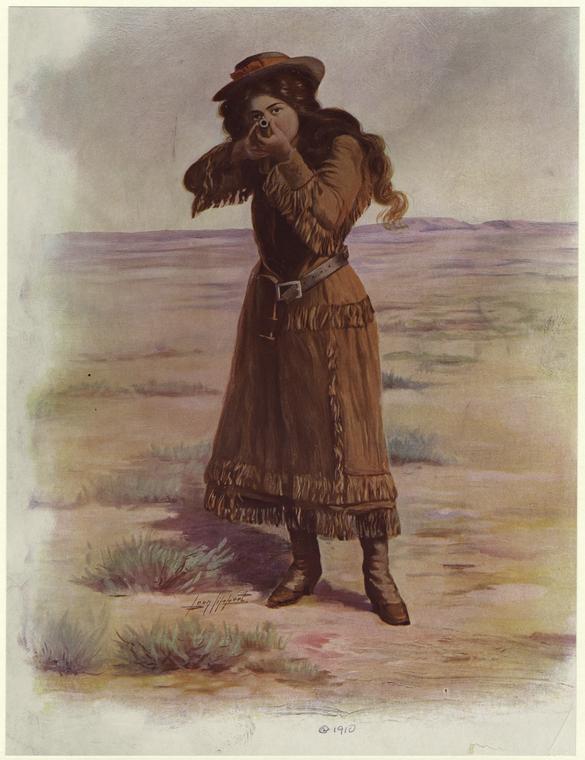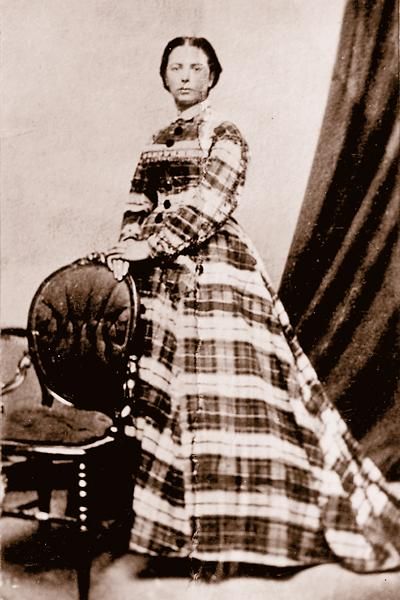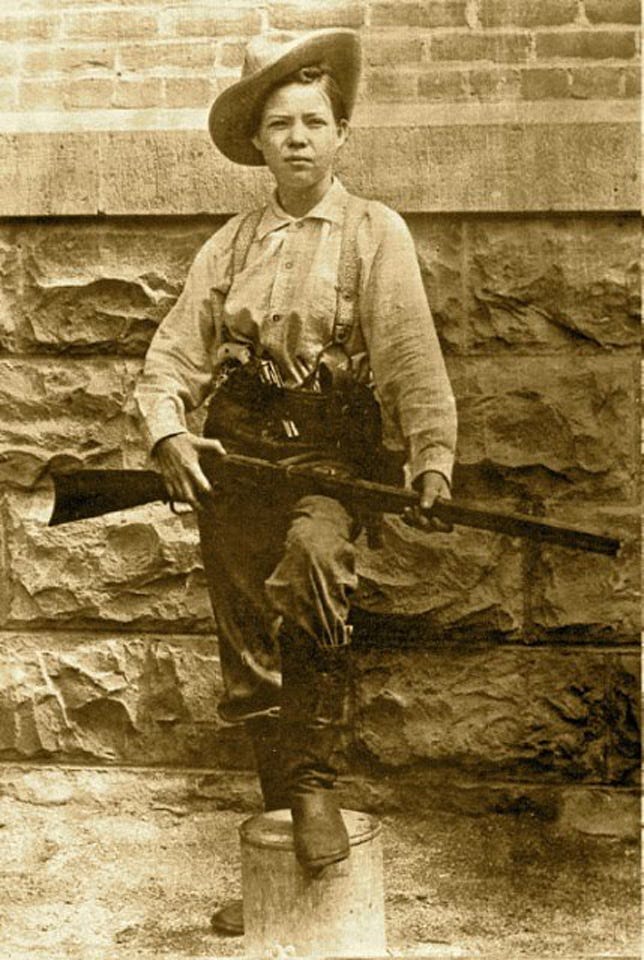 Buffalo Gals: Women in the American West
Part I: A Man’s World: Where No Woman Had Gone Before
Buffalo Gals: Women in the American West
Part I: A Man’s World: Where No Woman Had Gone Before
It took a special kind of woman to face the new frontier. Perhaps it could be said to have been at least partially responsible for a shift in attitude among women in America towards the middle of the nineteenth century. No longer would it be enough to be demure, elegant, soft-spoken and retiring, allowing men to direct every aspect of their lives. That might have worked in the big - and small - cities of the east, but out here in the West, out on the prairie or in the boom towns a woman would have to consider being able to look after herself. While she would almost certainly leave her home accompanied by a man, it was a long and dangerous journey, and there was no guarantee she would arrive at her destination with that man alive, if she reached it at all. But if she did reach it, having lost her man or men to anything from bandit raids or accidents to diseases or sunstroke or exposure, she would have nobody to fall back upon. Assuming she was not heading to already-established relatives, she would be alone and would have to carve out her own future in this brave new world. Nobody was going to help her, and if anything, any man she might encounter would be more likely to try to take advantage of her, so she would need to be able to take care of herself.
While the legend of the West does not lack entirely for female figures - who does not know Annie Oakely or Calamity Jane? - it kind of centres around those two figures, and if you ask anyone who isn’t a student of either feminism or the American West for other names, most will scratch their heads in puzzlement. I know I did. Overall, women in the West seem to traditionally fall into two broad (no pun intended) categories: gunslingers and whores or madams. But of course there were many, many brave women who accompanied their husbands out to the new frontier and made their homes there, and many who made a name for themselves, names which have been all but erased and ignored by history, as generally speaking, the Wild West was a man’s world, and its writers, to a very large degree, were and are men, and to be brutally honest, in these men’s view, women don’t belong on the range.

But belong or not, ignored or not, pushed to one side and told to hush up, they stubbornly refuse to be forgotten, and many books have been written (mostly, unsurprisingly, by women) chronicling their lives and adventures, and trying to place their contributions to the legend and history of the west into context amid all the gunsmoke, thundering of hooves and whooping of injuns. While the above two ladies certainly deserve their place in history, as do the likes of Belle Starr, Susan Anderson, Eleanor Dumont and Cathay Williams (the first African American woman to serve in the US Army), and they will be covered and given their voice in other sections, here I want to concentrate on more unsung heroes (yes, even less sung than these women, who are at least remembered slightly grudgingly, but are still remembered for all that) who have been completely excluded from the story of the west.
But as Winifred Gallagher puts it in her book
New Women in the Old West: From Settlers to Suffragists - An Untold American Story, the new frontier actually, almost paradoxically, provided and opened up new opportunities for women. “Women’s status also benefited from conditions in the West’s so-called settler society, which by definition was simpler, more forward-looking, and less encumbered by tradition, precedent, and an entrenched, oppositional establishment. During the hardscrabble settlement era, as in most of America today, it took two industrious partners to support a family, which increased women’s work and its value. In agrarian areas, unmarried women had their pick of suitors among men loath to homestead without a wife to handle the house and garden and earn much-needed cash from her “home production,” whether selling eggs and bread or taking in sewing or boarders.
In mining towns, women used those same domestic skills to make what seemed like small fortunes by marketing hot meals and clean laundry to the overwhelmingly male population. Some settlers also increased women’s civic profile by moving from the private into the public sphere as the “town mothers” who organized many of the West’s first schools, churches, and charities. These homemakers and community builders could not achieve economic much less political parity with men in the patriarchal system, but their record of hard work and dedication won respect and made them a force, albeit nonelectoral, to be reckoned with.”
In fact, equality for women would come sooner in the west than back in the east, where the worth of, and reliance on women was seen to be more important than was admitted by the comfortable city gents in their furnished houses with all their modern appliances and easy lifestyle. When you’re facing a harsh winter or a bleak summer without food or provisions, it’s surely an immense comfort to have the little woman there beside you, to share your tribulations as well as your triumphs. So why should they not be able to vote? Why should they be unequal? Despite the picture drawn by our old friend Hollywood of the woman of the west being a weak, ineffectual, often hysterical female who had no real role other than to be exploited or protected, depending on your protagonist(s) and the theme of the particular movie, respect for women grew exponentially in the west, leading to states such as Wyoming (the first in the USA), Utah (though later temporarily rescinded), Colorado and Idaho passing suffrage resolutions before the century was out.
The Homesteader Act, already mentioned earlier, did not differentiate between the sexes: man or woman could own land as long as they went to the west and cultivated it, and this was a huge step forward for women, who up until the passing of this act had been unable to own property if married. Another major development was the Morrill Land-Grant Act, passed a month later, which set up tuition-free colleges and universities, enabling women to study for careers traditionally dominated by men - law, medicine, journalism - and allowing them for the first time to be other than mere homemakers. This sudden influx of highly-educated and capable women (who could of course be, and were, paid less than their male counterparts) also opened up lucrative opportunities for employers, who had until then had to advertise all their positions for men only, and who probably, in most cases, found the idea of women working in their establishments a more attractive prospect.
A sort of reverse backlash in the east, too, meant that women who had until now been confined to the home could seek education in these new colleges and go into waitressing, work in factories, as secretaries and many other occupations previously denied to them for lack of education. The balance of power, work-wise, began to shift dramatically as women, almost
en masse, entered the workplace and threatened the dominance of the male. In some ways, these two acts of Congress could be said to have galvanised a sort of female revolution, symbolically striking from them the chains that had held them imprisoned and restricted for so long, and, to carry the analogy slightly further, releasing them into the wild.

Homesteaders, cowgirls, saloon keepers, all the women who kept the men on the straight and narrow (or failed to, or did exactly the opposite) and stood shoulder to shoulder with them against attacks and adversities. They deserve to be recognised and celebrated, and for my source on this I’m using Erin H. Turners’s
Wild West Women: Fifty Lives That Shaped the Frontier. Obviously I can’t feature all of them, but I will try to give a reasonable and varied cross-section.